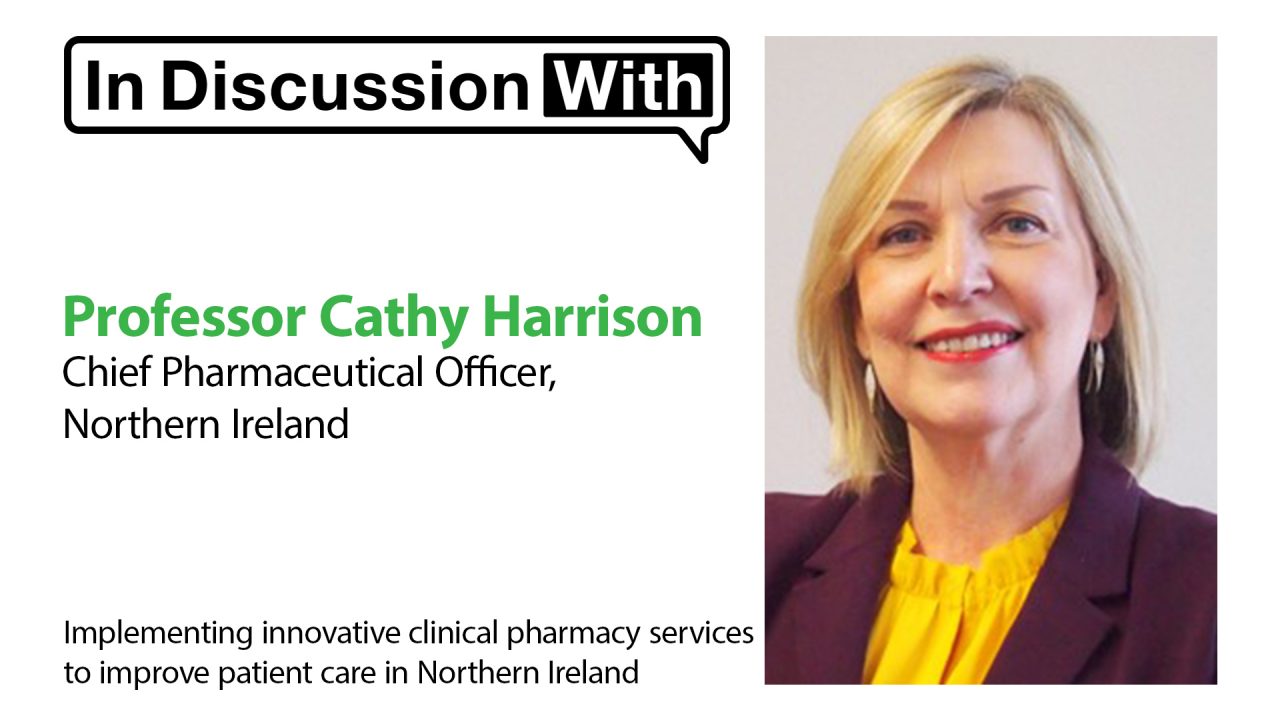Advertisment
Implementing innovative clinical pharmacy services to improve patient care in Northern Ireland

Innovative clinical pharmacy services have been developed in Northern Ireland that both improve patient care and save money. In this series of short videos Professor Cathy Harrison (Chief Pharmaceutical Officer at the Department of Health in Northern Ireland) describes how a strategy that combines collaborative working with incremental growth, based on robust evidence, has underpinned these developments.
Developments in healthcare – the background for new pharmacy services in Northern Ireland
Professor Harrison’s responsibilities include medicines policy, pharmacy practice, medicines access, safety, innovation, e-pharmacy, pharmacy workforce, and medicines efficiencies. An important part of her job is to work with the Chief Medical Officer and Chief Nursing Officer – “and we work very, very collaboratively to consider how our professions can best engage and deliver on the priorities for our patients and population”, she says.
Northern Ireland is experiencing a rising demand for medicines that is related to an ageing population. In addition, there are persistent health inequalities and the costs of medicines are rising. The risks of avoidable harm from medicines and the environmental impact of medicines are also factors that have to be considered.
In 2016 the Northern Ireland Medicines Optimisation Quality Framework was published. This identified high variance in medicines’ use as a key challenge and described what patients could expect when medicines were included in their care. It focused on translating the strong evidence from hospital clinical pharmacy practice to other settings.
In 2020 a Pharmacy Workforce Review highlighted declining university applications for pharmacy and the lack of clinical pharmacy practice outside of hospitals. It made recommendations focused on attracting, recruiting and training pharmacists, including developing new roles in general practice and consultant pharmacists in hospitals
How innovative clinical pharmacy services were funded & implemented in Northern Ireland
In Norther Ireland there is a skilled and growing clinical pharmacy workforce that is available to take on advanced practice roles, explains Professor Harrison. Clinical pharmacists are already offering faster access to care, improving the safe and cost-effective use of medicines, and optimising patient outcomes. They are connecting individuals with essential medicines and providing accessible clinical services in community pharmacies, she says.
Independent prescribers now comprise about 30% of the pharmacist workforce and the number is growing. An additional 1,000 pharmacy prescribers are expected by the end of this decade.
Funding for all the developments has been secured by following a general model that is best described as ‘start small, build the evidence base, compile the business case and scale up’. This approach was successfully used to provide every General Practice in Northern Ireland with the equivalent of a full-time General Practice pharmacist. The Pharmacy First service is now providing the base for developments in clinical practice in Community Pharmacy.
How new pharmacy services saved £20 million per year in Northern Ireland
Several key elements supported the spectacular developments in pharmacy services in Northern Ireland.
The Medicines Optimisation Quality Framework shifted the focus from individual settings, e.g. community pharmacy or hospital pharmacy, to a ‘whole system’ approach to medicines’ optimisation.
Championing belief and pride in pharmacy is a way of supporting the workforce and recognising the challenges they face and it “sends a strong message to other professions and the public around a sense of pride in ourselves and in our professionalism”, says Professor Harrison.
The Medicines Optimisation and Innovation Centre (MOIC) was established nearly 10 years ago to support the implementation of medicines’ optimisation. The Centre is funded by the Department of Health and is commissioned to conduct research, evaluations and reviews to inform policy and commissioning decisions and to ensure robust evaluation frameworks.
The Medicines’ Optimisation Regional Efficiency (MORE) programme focuses on cost-effective prescribing policies and robust procurement practices to deliver efficiencies. Over the past eight years, this programme has delivered about £200 million of savings in medicines’ costs for the health system in Northern Ireland.
Positioning pharmacy in Northern Ireland to make the most of independent prescribing
Plans are in place for the further development of General Practice Pharmacy services and Community Pharmacy in Northern Ireland. The anticipated influx of pharmacist independent prescribers will help to speed the process of translating clinical pharmacy from the hospital setting into General Practice and Community Pharmacy. A strategy that has been co-produced with General Practice could see full pharmacy teams (technician, pharmacist and advanced practice pharmacist) in each General Practice. In Community Pharmacy, Professor Harrison expects to increase the scope and impact of the Pharmacy First service.
Looking further ahead, future ambitions for pharmacy services in Northern Ireland include three key developments:
- Making the most of independent prescribing skills across all sectors
- A new ‘valuing medicine’ strategy that will focus on environmental awareness, data improvement, and supply model cost-effectiveness
- Revisiting hospital pharmacy practice in 2025 and focusing on clinical pharmacy in the digital age
The developments that have taken place in Northern Ireland are readily translatable to other settings. Professor Harrison advocates:
- Engage with stakeholders to get buy-in; work with the willing
- Focus on small successes and measure impact ruthlessly
- Prioritise: have a plan and focus on leadership – your leadership and the leadership within your system
- Always stay patient-centred
This interview was based on the keynote lecture the Professor Harrison gave at the European Society of Clinical Pharmacy (ESCP) Symposium in 2024 in Krakow, Poland.
About Cathy Harrison
Professor Cathy Harrison is the Chief Pharmaceutical Officer for Northern Ireland, working at the Department of Health.
She studied pharmacy at Liverpool John Moore’s University and later completed a Master’s degree at Queen’s University, Belfast. After graduation in 1989 she worked in community pharmacy in England and Northern Ireland before joining the Department of Health in 2005 as Principal Pharmaceutical Officer. She was later promoted to Deputy Chief Pharmaceutical Officer and appointed Chief Pharmaceutical Officer in January 2020.
Professor Harrison leads a wide-ranging work programme involving pharmacy and medicines policy and legislation. She is committed to realising pharmacy’s greater contribution to better health outcomes for patients and more effective utilisation of health resources.
She is honorary Professor of Practice at Queen’s University Belfast.
Read and watch the full series on our website or on YouTube.






